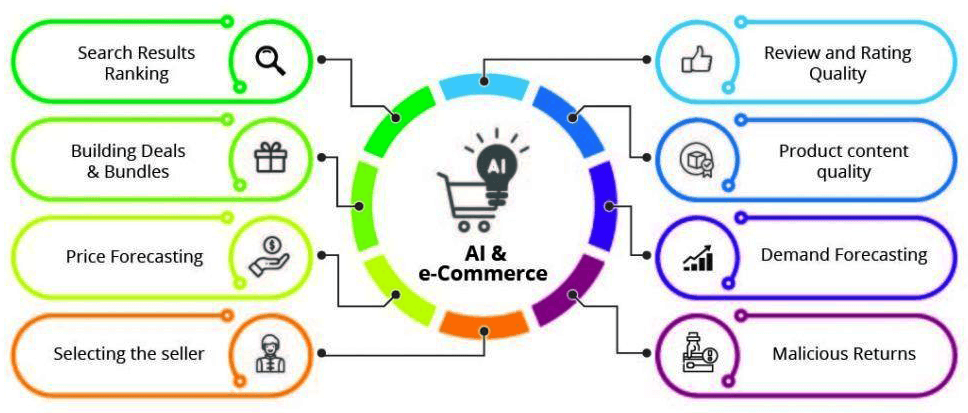Introduction:
Machine learning for e-commerce has gained significant traction as businesses strive to stay ahead in the rapidly evolving world of online retail. With its capacity to analyze vast amounts of data and make intelligent predictions, machine learning is revolutionizing the way e-commerce operates. In this blog post, we will explore the concept of machine learning for e-commerce, its numerous benefits, and how it is transforming the online shopping experience.

What is Machine Learning for E-Commerce?
Machine learning, a subset of artificial intelligence, enables computers to learn and make predictions without being explicitly programmed. In the context of e-commerce, machine learning algorithms analyze customer behaviour, purchase history, and other data points to provide personalized recommendations, optimize pricing strategies, automate inventory management, and enhance customer service.
Machine learning for e-commerce combines data science and predictive modelling to deliver actionable insights. By harnessing the power of algorithms and statistical techniques, businesses can unlock hidden patterns in customer data, leading to improved decision-making and enhanced customer experiences.
Benefits of Machine Learning in E-Commerce
Machine learning offers several compelling advantages for e-commerce businesses:
Personalized Recommendations For Machine Learning for E-Commerce:
Machine learning algorithms analyze customer preferences, browsing history, and purchase patterns to provide personalized product recommendations. This tailored approach not only increases customer engagement but also boosts sales and customer loyalty.
Pricing Optimization:
By leveraging machine learning, e-commerce businesses can optimize their pricing strategies based on factors such as market demand, competitor pricing, and customer behaviour. Dynamic pricing models can be implemented to maximize revenue and stay competitive.
Fraud Detection:
Machine learning algorithms can detect and prevent fraudulent transactions by analyzing patterns, anomalies, and user behaviour. This helps safeguard the business and its customers from financial loss and security breaches.
These benefits of machine learning are driving its adoption across various facets of e-commerce. As businesses strive to deliver personalized experiences and optimize their operations, machine learning provides the necessary tools to unlock valuable insights and gain a competitive edge.
Applications: Machine Learning For E-Commerce
Machine learning finds application in several key areas within e-commerce:
Customer Segmentation:
Businesses can target specific customer segments with tailored marketing campaigns and offer by segmenting customers based on their behaviour, demographics, and preferences. This enhances customer engagement and conversion rates.
Demand Forecasting:
Machine learning algorithms can analyze historical sales data, market trends, and external factors to forecast future demand accurately. This enables businesses to optimize their inventory management, minimize stockouts, and reduce carrying costs.
The applications of machine learning in e-commerce are vast and continue to expand as technology advances. By leveraging these applications, businesses can streamline their operations, deliver personalized experiences, and drive growth.
AI and Machine Learning Tools for the E-Commerce Industry
AI and machine learning tools have revolutionized the e-commerce industry, empowering businesses to gain valuable insights, automate processes, and enhance decision-making. Let’s explore some of the top AI and machine learning tools available for the e-commerce industry:
Chatbots and Virtual Assistants For Machine Learning For E-Commerce
Chatbots and virtual assistants powered by AI and machine learning have become invaluable tools for e-commerce businesses. These tools provide instant and personalized customer support, answer queries, recommend products, and assist in the purchasing process. By leveraging natural language processing and machine learning algorithms, chatbots and virtual assistants improve customer engagement and streamline the shopping experience.
Recommendation Engines
Recommendation engines driven by AI and machine learning algorithms have transformed how e-commerce platforms suggest products to their customers. By analyzing past purchases, browsing behaviour, and customer preferences, recommendation engines provide personalized product recommendations, increasing cross-selling and upselling opportunities. These tools enhance the customer experience, foster customer loyalty, and drive revenue growth.
Demand Forecasting and Inventory Management
AI and machine learning tools enable e-commerce businesses to optimize their inventory management processes. By analyzing historical sales data, market trends, and external factors, these tools accurately forecast demand and ensure optimal stock levels. Demand forecasting and inventory management tools help minimize stockouts, reduce carrying costs, and improve overall operational efficiency.
Pricing Optimization
Pricing optimization tools powered by AI and machine learning algorithms help e-commerce businesses dynamically adjust prices based on market demand, competitor analysis, and customer behaviour. These tools automate pricing strategies, enabling businesses to maximize revenue, remain competitive, and respond quickly to market fluctuations.
Fraud Detection and Security
AI and machine learning plays a crucial role in fraud detection and security within the e-commerce industry. By analyzing patterns, anomalies, and user behavior, these tools identify and prevent fraudulent transactions, protecting both businesses and customers from financial loss and security breaches. Advanced algorithms can detect suspicious activities, validate user identities, and enhance overall security measures.
These AI and machine learning tools are just a glimpse of the vast array of technologies available to e-commerce businesses. As technology continues to advance, the e-commerce industry will witness further innovation and integration of AI and machine learning, enabling businesses to optimize their operations, deliver personalized experiences, and drive sustainable growth.
The availability of AI and machine learning tools for the e-commerce industry has opened up new avenues for businesses to thrive in a highly competitive market. By harnessing these tools’ capabilities, e-commerce businesses can leverage data-driven insights, streamline operations, enhance customer experiences, and stay ahead in the dynamic landscape of online retail.
The Future of Machine Learning in E-Commerce
Machine learning is poised to play a pivotal role in shaping the future of e-commerce. As advancements in technology continue, we can expect further innovation and integration of machine learning algorithms in various aspects of the online shopping experience.

From conversational chatbots and virtual shopping assistants to image recognition and voice search, machine learning will enable e-commerce businesses to offer seamless and intuitive shopping experiences. The ability to leverage data and make data-driven decisions will become even more critical as companies seek to stay competitive and meet evolving customer expectations.
Machine learning has emerged as a game-changer in the world of e-commerce, revolutionizing how businesses operate and interact with customers. By harnessing the power of data analysis, predictive modelling, and automation, businesses can enhance personalization, optimize pricing strategies, and improve operational efficiency. Embracing machine learning is no longer a luxury but a necessity for e-commerce businesses looking to thrive in a highly competitive digital landscape.
Embrace the Power of AI and Machine Learning for E-Commerce Success
The transformative impact of AI and machine learning in the e-commerce industry cannot be overstated. From personalized recommendations and optimized pricing strategies to streamlined inventory management and enhanced security, these technologies have become indispensable for businesses looking to thrive in the digital marketplace.
If you’re intrigued by the potential of AI and machine learning in e-commerce, there’s more to discover. Visit my Portfolio Blog regularly for further insights, in-depth articles, and resources that delve into the intersection of technology and online retail. Explore the captivating world of e-commerce innovation and gain a competitive edge.
To stay updated with the latest trends and engage in discussions, join my social media pages at Urdu Nama, Facebook, Twitter, LinkedIn, YouTube, and Instagram or Contact me on WhatsApp. Connect with like-minded individuals, industry experts, and fellow e-commerce enthusiasts. Together, we can explore the limitless possibilities and drive the future of e-commerce powered by AI and machine learning.
Remember, the e-commerce landscape is constantly evolving, and staying informed is key to success. Revisit my Portfolio regularly for fresh perspectives, informative content, and actionable strategies that can propel your business forward in the fast-paced world of online retail.
